Unit 6 核心知识点讲练 课件(新目标七年级下册Unit 6 I'm watching TV)
文档属性
| 名称 | Unit 6 核心知识点讲练 课件(新目标七年级下册Unit 6 I'm watching TV) | 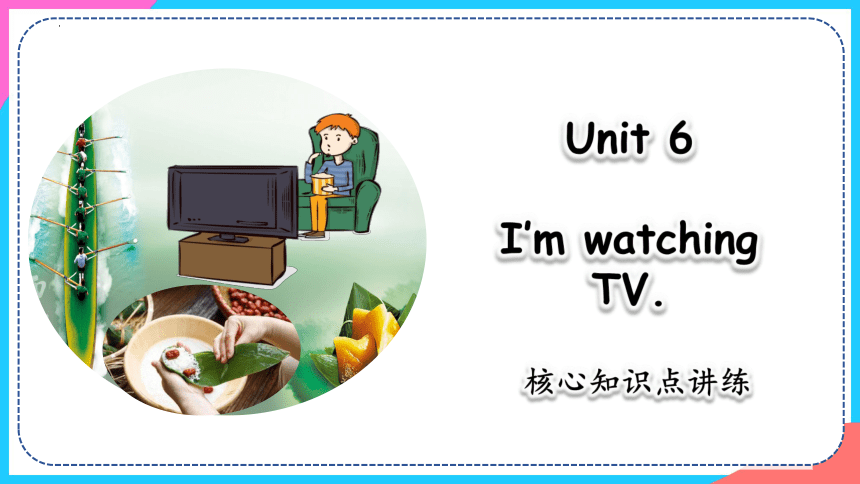 | |
| 格式 | pptx | ||
| 文件大小 | 1.6MB | ||
| 资源类型 | 试卷 | ||
| 版本资源 | 人教新目标(Go for it)版 | ||
| 科目 | 英语 | ||
| 更新时间 | 2024-04-03 14:32:01 | ||
图片预览

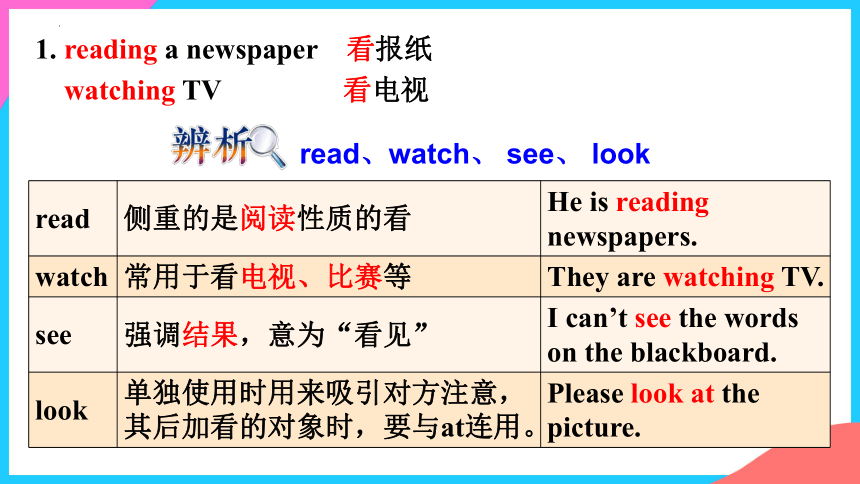
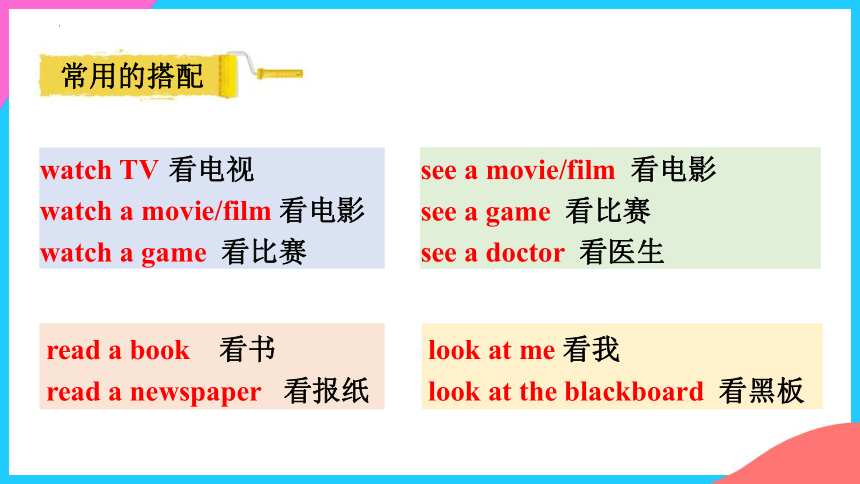
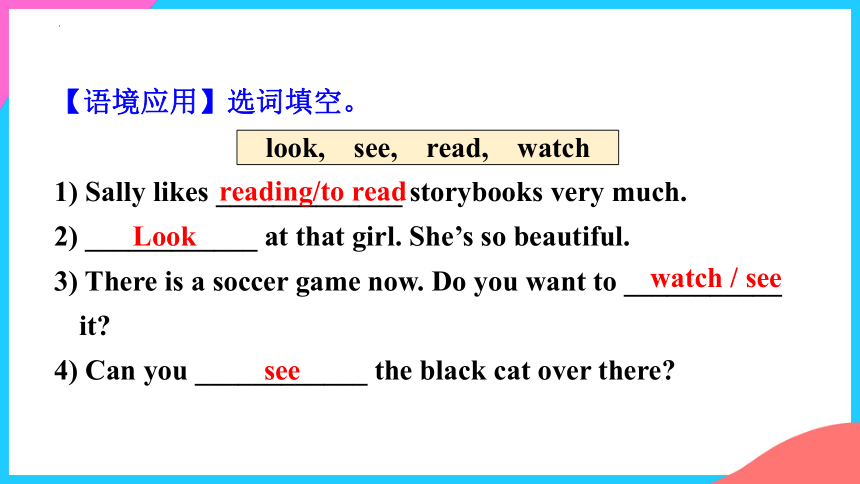
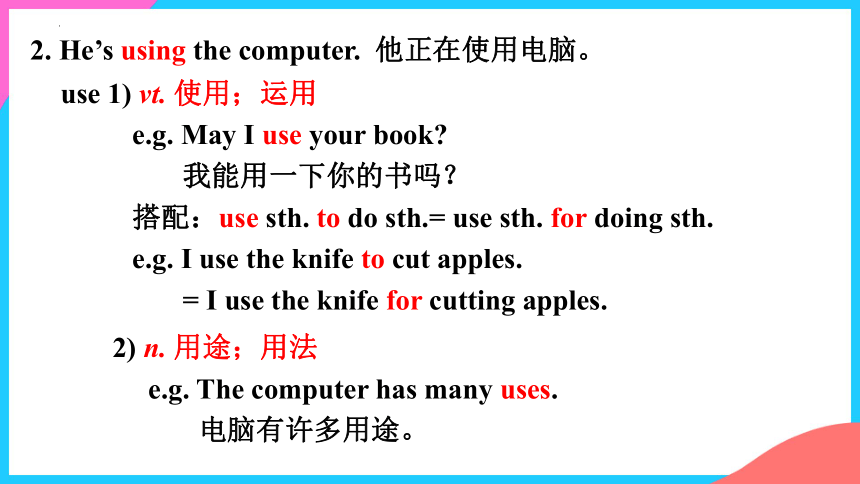
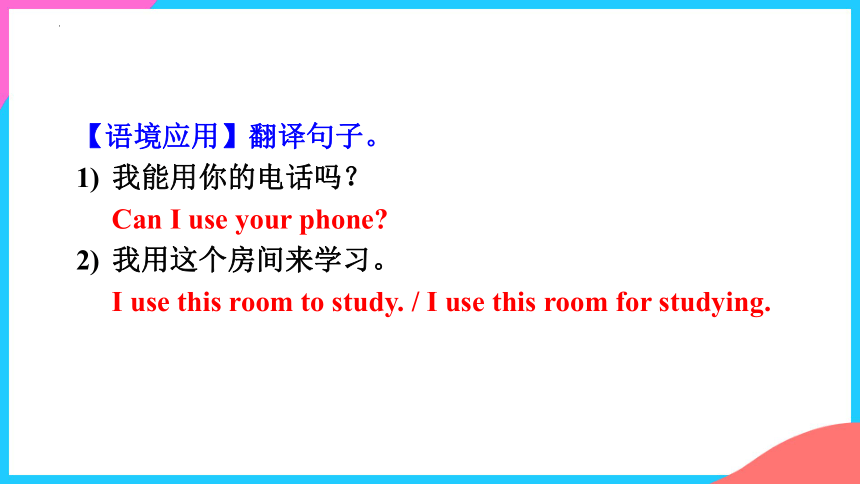
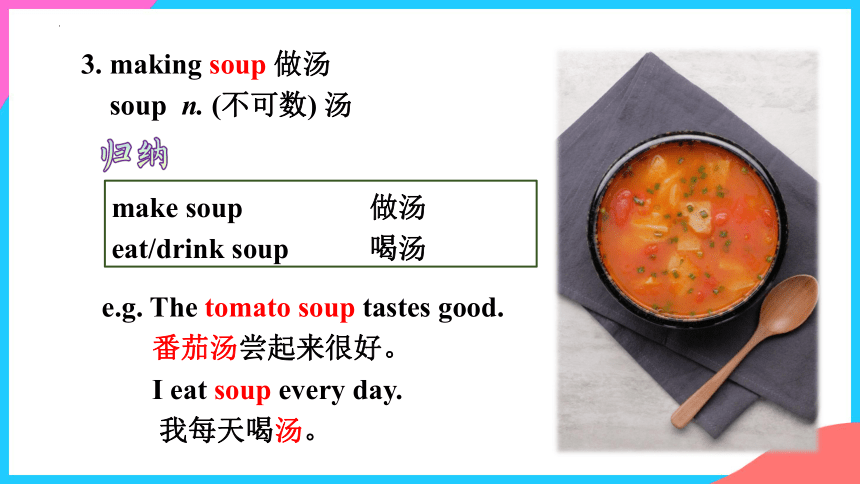

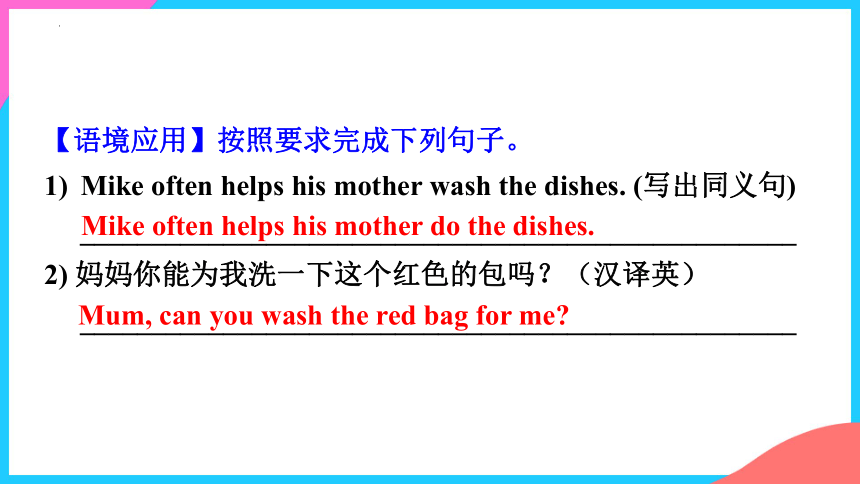
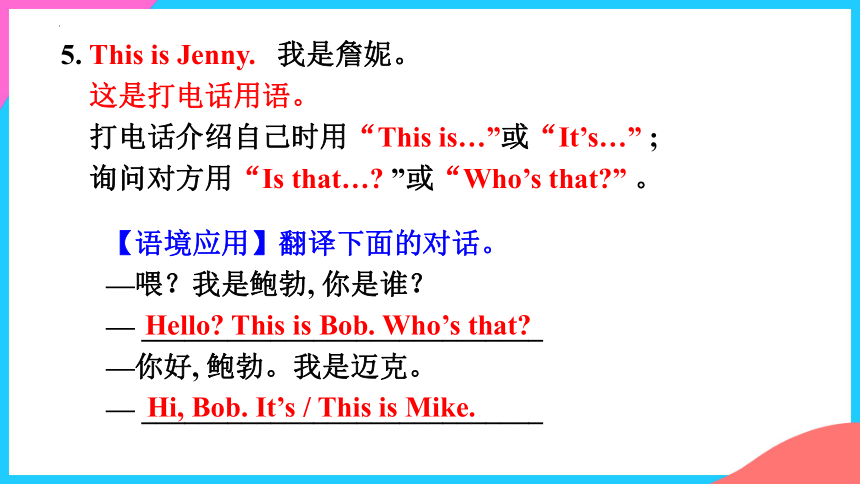
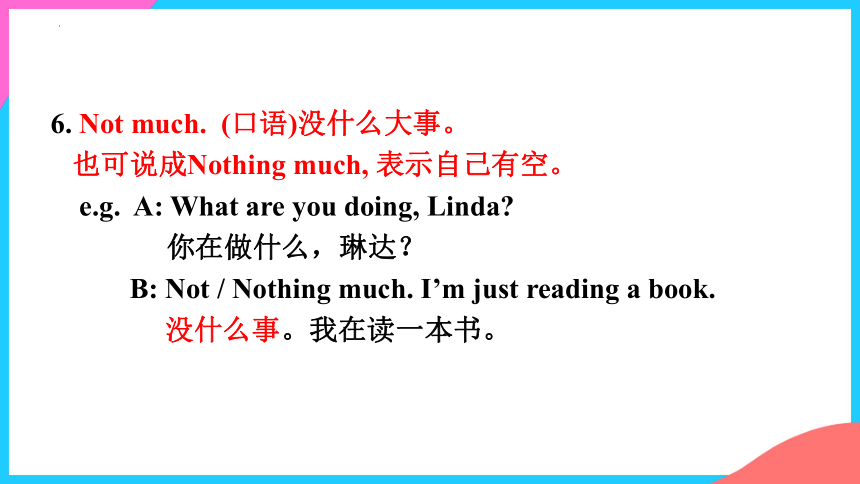
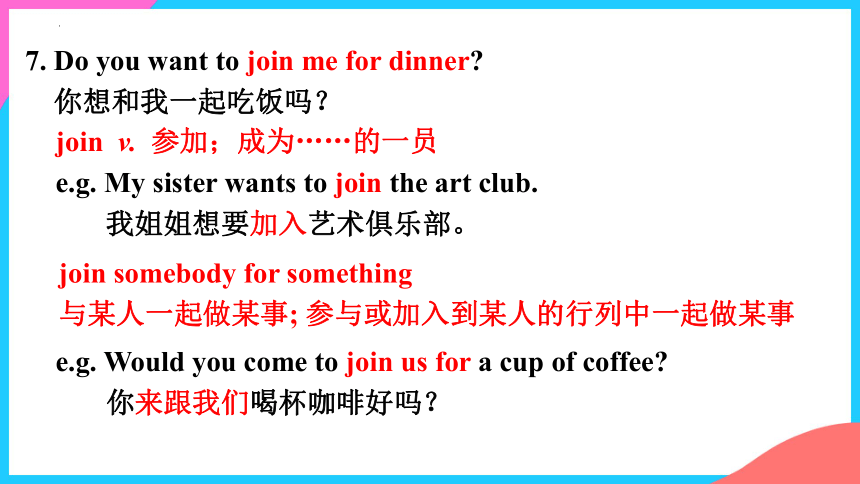
文档简介
(共32张PPT)
Unit 6
I’m watching TV.
核心知识点讲练
1. reading a newspaper 看报纸
watching TV 看电视
read 侧重的是阅读性质的看 He is reading newspapers.
watch 常用于看电视、比赛等 They are watching TV.
see 强调结果,意为“看见” I can’t see the words on the blackboard.
look 单独使用时用来吸引对方注意,其后加看的对象时,要与at连用。 Please look at the picture.
read、watch、 see、 look
watch TV 看电视
watch a movie/film 看电影
watch a game 看比赛
常用的搭配
read a book 看书
read a newspaper 看报纸
look at me 看我
look at the blackboard 看黑板
see a movie/film 看电影
see a game 看比赛
see a doctor 看医生
【语境应用】选词填空。
1) Sally likes _____________ storybooks very much.
2) ____________ at that girl. She’s so beautiful.
3) There is a soccer game now. Do you want to ___________ it
4) Can you ____________ the black cat over there
look, see, read, watch
reading/to read
Look
watch / see
see
2. He’s using the computer. 他正在使用电脑。
use 1) vt. 使用;运用
e.g. May I use your book
我能用一下你的书吗?
搭配:use sth. to do sth.= use sth. for doing sth.
e.g. I use the knife to cut apples.
= I use the knife for cutting apples.
2) n. 用途;用法
e.g. The computer has many uses.
电脑有许多用途。
【语境应用】翻译句子。
我能用你的电话吗?
Can I use your phone
我用这个房间来学习。
I use this room to study. / I use this room for studying.
3. making soup 做汤
soup n. (不可数) 汤
make soup 做汤
eat/drink soup 喝汤
e.g. The tomato soup tastes good.
番茄汤尝起来很好。
I eat soup every day.
我每天喝汤。
4. washing dishes 洗餐具
wash vt. 洗
wash the dishes=do the dishes 洗餐具
wash sth. for sb. 为某人洗某物
e.g. I often wash / do the dishes at home.
我在家经常洗餐具。
Can you wash the T-shirt for me
你能为我洗一下T恤吗?
【语境应用】按照要求完成下列句子。
Mike often helps his mother wash the dishes. (写出同义句)
__________________________________________________
2) 妈妈你能为我洗一下这个红色的包吗?(汉译英)
__________________________________________________
Mum, can you wash the red bag for me
Mike often helps his mother do the dishes.
5. This is Jenny. 我是詹妮。
这是打电话用语。
打电话介绍自己时用“This is…”或“It’s…” ;
询问对方用“Is that… ”或“Who’s that ” 。
【语境应用】翻译下面的对话。
—喂?我是鲍勃, 你是谁?
— ____________________________
—你好, 鲍勃。我是迈克。
— ____________________________
Hello This is Bob. Who’s that
Hi, Bob. It’s / This is Mike.
6. Not much. (口语)没什么大事。
也可说成Nothing much, 表示自己有空。
e.g. A: What are you doing, Linda
你在做什么,琳达?
B: Not / Nothing much. I’m just reading a book.
没什么事。我在读一本书。
7. Do you want to join me for dinner
你想和我一起吃饭吗?
e.g. Would you come to join us for a cup of coffee
你来跟我们喝杯咖啡好吗?
join v. 参加;成为……的一员
e.g. My sister wants to join the art club.
我姐姐想要加入艺术俱乐部。
join somebody for something
与某人一起做某事; 参与或加入到某人的行列中一起做某事
【语境应用】完成句子。
1) —Hi, Ann! Betty and I want to go swimming. _____________ ____________________ (你想加入我们吗)
—I’d love to. Let’s go.
2) 你可以和我们一起散步。
You can _____________________________.
Would you like/
Do you want to join us
join us for a walk
8. I’d love to. 我很乐意。
1) 交际用语,用于礼貌地接受他人邀请,还可以说成 I’d like to,但语气稍弱。
e.g. —Would you like to come with us to the show
你愿意跟我们一起去看表演吗?
—Thanks. _______________
谢谢,我愿意。
I’d like/love to.
2) 当委婉拒绝他人邀请时, 可用I’d love to, but... (but后一般给出拒绝原因)。
—我想去购物,你想跟我一同去吗?
— ______________________________________________
—我很想去, 我还有好多作业要做呢。
— ______________________________________________
【语境应用】翻译下面的对话。
I want to go shopping. Would you like to join me
I’d love to, but I still have lots of homework to do.
drink v. 喝
drink wine 喝酒 drink water 喝水
drink tea 喝茶 drink coffee 喝咖啡
drink juice 喝果汁 drink beer 喝啤酒
drink milk 喝牛奶
其他“喝”的英文表达:
have milk / tea 喝牛奶 / 茶
take / have coffee 喝咖啡
have / eat porridge / soup 喝粥 / 汤
1. shop n. 商店 (与store同义)
v. 购物 shop for sth. 买某物
e.g. Mrs. Green works at a fruit shop.
Mrs. Green在一个水果店工作。
I want to shop for a new shirt this weekend.
我这周末想去买件新衬衣。
go shopping 去购物;去买东西
do the / some shopping去购物;去买东西
shopping center 购物中心
a shopping bag 购物袋
【语境应用】完成句子。
1) Bob的姨妈在一个服装店上班。
Bob’s aunt works in a(n) ___________________.
2) 你想和我去购物吗?
Do you want to _________________________________
___________________________________ me
clothes store / shop
shop with / go shopping with / do the
shopping with / do some shopping with
2. man n. 男人; 人 (复数形式为men)
名词修饰名词时,若前面的名词是man和woman,变复数时,两个名词都变为复数形式 。
e.g. a man teacher → two men teachers
如果是其他名词修饰,变复数时,只需把后面的名词变为复数形式。
e.g. a girl student → two girl students
名词变复数不规则的词还有:
woman (女子) → women child (儿童) → children
foot (脚) → feet tooth (牙齿) → teeth mouse (老鼠) → mice
【语境应用】完成句子。
1) 我们学校有很多女老师。
There are many _______ _________ in our school.
2) 她有三个孩子——两个儿子,一个女儿。
She has _______ _______ — two sons and one daughter.
3) Susan一周上两节钢琴课。
Susan has two _______ _______ a week.
women teachers
three children
piano lessons
中国各种传统节日的英语译文并非只有一种,以下是一些常见的我国传统节日的英语表达:
春节:Spring Festival; Chinese New Year’s Day;
Chinese New Year
元宵节:Lantern Festival
清明节:Qingming Festival; Tomb-sweeping Day
端午节:Dragon Boat Festival
中秋节:Mid-Autumn Festival; Mid-Autumn Day
重阳节:Double Ninth Festival
1. His dad and uncle are watching the boat races on TV.
他的爸爸和叔叔正在电视上看龙舟比赛。
race用于体育话题时, 主要指赛跑、赛车、游泳等与速度有关的“比赛”; 而game则多指球类、棋类等体育“比赛”。
【语境应用】翻译。
1) 你喜欢在电视上看足球赛吗?
Do you like watching football games on TV
2) 我不喜欢这场车赛。
I don’t like the car race.
2. But there isn’t a Dragon Boat Festival in the US, so it’s like any other night for Zhu Hui and his host family.
但是在美国没有端午节,所以对朱辉和他的房东家人来说,今晚和平时的晚上是一样的。
1) any other + 名词单数形式
(除了某个以外)其他的任何一个
e.g. Jack看上去像其他和他同龄的孩子一样。
Jack is like any other boy of his age.
人们出国时所借宿的人家, 类似汉语中“房东家”
any adj. 任何的;任一的
e.g. You can take any book.
你可以拿走任意一本书。
Any child will love them.
任何一个小孩都会喜欢它们。
pron. 任何,任一
e.g. The children needed new school clothes and Kim couldn’t afford any.
孩子们需要新校服,可是Kim一件也买不起。
any还可修饰名词,表示 “一些,一点,少许” ,此时与some意思相近。但二者在用法上是有区别的。
some一般用于肯定句或表示请求、建议的疑问句中。
e.g. There are some children outside.
Will you have some bread
any一般用于否定句和疑问句中。
e.g. I don’t eat any meat.
Are there any tigers in the zoo
【语境应用】根据句意,选用some或any填空。
1) Go to the supermarket and buy ______ vegetables.
2) There aren’t ______ interesting books there.
3) Do you have ______ money
4) ______ teacher here is good.
5) Would you like ______ rice
some
any
any
Any
some
other adj. 另外的;其他的
e.g. The other hotels are all full.
其他的旅馆都已住满了。
Do you have any other questions
你还有别的什么问题吗?
pron. 另外的人(或物)
e.g. Some of these movies are good. Others are not.
这些电影中有些是好的,有些不好。
3. Zhu Hui misses his family and wishes to have his mom’s delicious zongzi.
朱辉思念他的家人并希望吃上他妈妈的可口的粽子。
miss v. 思念; 想念 第三人称单数形式为:misses
e.g. How’s it going I miss you very much. 最近怎么样?我很想念你。
miss v. 错过,没赶上
e.g. Get up quickly, or you will miss the bus. (翻译)
赶快起床, 否则你会赶不上公共汽车。
当miss首字母大写变为Miss时,意为“小姐”,常用于未婚女性的姓氏前,以示礼貌,或指“女老师”。
【语境应用】写出划线部分的汉语意思。
1) Excuse me, Miss, where is the computer room _______
2) Goodbye, Sam, I will miss you. _______
3) If (如果) you don’t leave now, you will miss your
train. _______________
老师
思念你
错过你的火车
2) wish v. 希望
wish to do sth. 希望做某事;想做某事
I wish to meet my uncle there.
我希望在那里能见到我的叔叔。
wish sb. / sth. + adj. 希望某人 / 某物如何
I wish you healthy.
我希望你身体健康。/祝你身体健康。
wish sb. + n. 祝愿某人如何
I wish you a long life.
祝你长命百岁。
【语境应用】根据汉语意思完成英语句子,每空一词。
1) 他们祝我们好运。
They __________ us __________ __________.
2) 我希望待在这里。
I __________ __________ __________ here.
3) 祝你快乐。
I __________ you __________.
wish good luck
wish to stay
wish happy
4. No place like home. (翻译)
千好万好还是不如自己的家好。
(金窝银窝不如自己的狗窝。)
英语中还有一句类似的谚语:
East, west, home is best.
Unit 6
I’m watching TV.
核心知识点讲练
1. reading a newspaper 看报纸
watching TV 看电视
read 侧重的是阅读性质的看 He is reading newspapers.
watch 常用于看电视、比赛等 They are watching TV.
see 强调结果,意为“看见” I can’t see the words on the blackboard.
look 单独使用时用来吸引对方注意,其后加看的对象时,要与at连用。 Please look at the picture.
read、watch、 see、 look
watch TV 看电视
watch a movie/film 看电影
watch a game 看比赛
常用的搭配
read a book 看书
read a newspaper 看报纸
look at me 看我
look at the blackboard 看黑板
see a movie/film 看电影
see a game 看比赛
see a doctor 看医生
【语境应用】选词填空。
1) Sally likes _____________ storybooks very much.
2) ____________ at that girl. She’s so beautiful.
3) There is a soccer game now. Do you want to ___________ it
4) Can you ____________ the black cat over there
look, see, read, watch
reading/to read
Look
watch / see
see
2. He’s using the computer. 他正在使用电脑。
use 1) vt. 使用;运用
e.g. May I use your book
我能用一下你的书吗?
搭配:use sth. to do sth.= use sth. for doing sth.
e.g. I use the knife to cut apples.
= I use the knife for cutting apples.
2) n. 用途;用法
e.g. The computer has many uses.
电脑有许多用途。
【语境应用】翻译句子。
我能用你的电话吗?
Can I use your phone
我用这个房间来学习。
I use this room to study. / I use this room for studying.
3. making soup 做汤
soup n. (不可数) 汤
make soup 做汤
eat/drink soup 喝汤
e.g. The tomato soup tastes good.
番茄汤尝起来很好。
I eat soup every day.
我每天喝汤。
4. washing dishes 洗餐具
wash vt. 洗
wash the dishes=do the dishes 洗餐具
wash sth. for sb. 为某人洗某物
e.g. I often wash / do the dishes at home.
我在家经常洗餐具。
Can you wash the T-shirt for me
你能为我洗一下T恤吗?
【语境应用】按照要求完成下列句子。
Mike often helps his mother wash the dishes. (写出同义句)
__________________________________________________
2) 妈妈你能为我洗一下这个红色的包吗?(汉译英)
__________________________________________________
Mum, can you wash the red bag for me
Mike often helps his mother do the dishes.
5. This is Jenny. 我是詹妮。
这是打电话用语。
打电话介绍自己时用“This is…”或“It’s…” ;
询问对方用“Is that… ”或“Who’s that ” 。
【语境应用】翻译下面的对话。
—喂?我是鲍勃, 你是谁?
— ____________________________
—你好, 鲍勃。我是迈克。
— ____________________________
Hello This is Bob. Who’s that
Hi, Bob. It’s / This is Mike.
6. Not much. (口语)没什么大事。
也可说成Nothing much, 表示自己有空。
e.g. A: What are you doing, Linda
你在做什么,琳达?
B: Not / Nothing much. I’m just reading a book.
没什么事。我在读一本书。
7. Do you want to join me for dinner
你想和我一起吃饭吗?
e.g. Would you come to join us for a cup of coffee
你来跟我们喝杯咖啡好吗?
join v. 参加;成为……的一员
e.g. My sister wants to join the art club.
我姐姐想要加入艺术俱乐部。
join somebody for something
与某人一起做某事; 参与或加入到某人的行列中一起做某事
【语境应用】完成句子。
1) —Hi, Ann! Betty and I want to go swimming. _____________ ____________________ (你想加入我们吗)
—I’d love to. Let’s go.
2) 你可以和我们一起散步。
You can _____________________________.
Would you like/
Do you want to join us
join us for a walk
8. I’d love to. 我很乐意。
1) 交际用语,用于礼貌地接受他人邀请,还可以说成 I’d like to,但语气稍弱。
e.g. —Would you like to come with us to the show
你愿意跟我们一起去看表演吗?
—Thanks. _______________
谢谢,我愿意。
I’d like/love to.
2) 当委婉拒绝他人邀请时, 可用I’d love to, but... (but后一般给出拒绝原因)。
—我想去购物,你想跟我一同去吗?
— ______________________________________________
—我很想去, 我还有好多作业要做呢。
— ______________________________________________
【语境应用】翻译下面的对话。
I want to go shopping. Would you like to join me
I’d love to, but I still have lots of homework to do.
drink v. 喝
drink wine 喝酒 drink water 喝水
drink tea 喝茶 drink coffee 喝咖啡
drink juice 喝果汁 drink beer 喝啤酒
drink milk 喝牛奶
其他“喝”的英文表达:
have milk / tea 喝牛奶 / 茶
take / have coffee 喝咖啡
have / eat porridge / soup 喝粥 / 汤
1. shop n. 商店 (与store同义)
v. 购物 shop for sth. 买某物
e.g. Mrs. Green works at a fruit shop.
Mrs. Green在一个水果店工作。
I want to shop for a new shirt this weekend.
我这周末想去买件新衬衣。
go shopping 去购物;去买东西
do the / some shopping去购物;去买东西
shopping center 购物中心
a shopping bag 购物袋
【语境应用】完成句子。
1) Bob的姨妈在一个服装店上班。
Bob’s aunt works in a(n) ___________________.
2) 你想和我去购物吗?
Do you want to _________________________________
___________________________________ me
clothes store / shop
shop with / go shopping with / do the
shopping with / do some shopping with
2. man n. 男人; 人 (复数形式为men)
名词修饰名词时,若前面的名词是man和woman,变复数时,两个名词都变为复数形式 。
e.g. a man teacher → two men teachers
如果是其他名词修饰,变复数时,只需把后面的名词变为复数形式。
e.g. a girl student → two girl students
名词变复数不规则的词还有:
woman (女子) → women child (儿童) → children
foot (脚) → feet tooth (牙齿) → teeth mouse (老鼠) → mice
【语境应用】完成句子。
1) 我们学校有很多女老师。
There are many _______ _________ in our school.
2) 她有三个孩子——两个儿子,一个女儿。
She has _______ _______ — two sons and one daughter.
3) Susan一周上两节钢琴课。
Susan has two _______ _______ a week.
women teachers
three children
piano lessons
中国各种传统节日的英语译文并非只有一种,以下是一些常见的我国传统节日的英语表达:
春节:Spring Festival; Chinese New Year’s Day;
Chinese New Year
元宵节:Lantern Festival
清明节:Qingming Festival; Tomb-sweeping Day
端午节:Dragon Boat Festival
中秋节:Mid-Autumn Festival; Mid-Autumn Day
重阳节:Double Ninth Festival
1. His dad and uncle are watching the boat races on TV.
他的爸爸和叔叔正在电视上看龙舟比赛。
race用于体育话题时, 主要指赛跑、赛车、游泳等与速度有关的“比赛”; 而game则多指球类、棋类等体育“比赛”。
【语境应用】翻译。
1) 你喜欢在电视上看足球赛吗?
Do you like watching football games on TV
2) 我不喜欢这场车赛。
I don’t like the car race.
2. But there isn’t a Dragon Boat Festival in the US, so it’s like any other night for Zhu Hui and his host family.
但是在美国没有端午节,所以对朱辉和他的房东家人来说,今晚和平时的晚上是一样的。
1) any other + 名词单数形式
(除了某个以外)其他的任何一个
e.g. Jack看上去像其他和他同龄的孩子一样。
Jack is like any other boy of his age.
人们出国时所借宿的人家, 类似汉语中“房东家”
any adj. 任何的;任一的
e.g. You can take any book.
你可以拿走任意一本书。
Any child will love them.
任何一个小孩都会喜欢它们。
pron. 任何,任一
e.g. The children needed new school clothes and Kim couldn’t afford any.
孩子们需要新校服,可是Kim一件也买不起。
any还可修饰名词,表示 “一些,一点,少许” ,此时与some意思相近。但二者在用法上是有区别的。
some一般用于肯定句或表示请求、建议的疑问句中。
e.g. There are some children outside.
Will you have some bread
any一般用于否定句和疑问句中。
e.g. I don’t eat any meat.
Are there any tigers in the zoo
【语境应用】根据句意,选用some或any填空。
1) Go to the supermarket and buy ______ vegetables.
2) There aren’t ______ interesting books there.
3) Do you have ______ money
4) ______ teacher here is good.
5) Would you like ______ rice
some
any
any
Any
some
other adj. 另外的;其他的
e.g. The other hotels are all full.
其他的旅馆都已住满了。
Do you have any other questions
你还有别的什么问题吗?
pron. 另外的人(或物)
e.g. Some of these movies are good. Others are not.
这些电影中有些是好的,有些不好。
3. Zhu Hui misses his family and wishes to have his mom’s delicious zongzi.
朱辉思念他的家人并希望吃上他妈妈的可口的粽子。
miss v. 思念; 想念 第三人称单数形式为:misses
e.g. How’s it going I miss you very much. 最近怎么样?我很想念你。
miss v. 错过,没赶上
e.g. Get up quickly, or you will miss the bus. (翻译)
赶快起床, 否则你会赶不上公共汽车。
当miss首字母大写变为Miss时,意为“小姐”,常用于未婚女性的姓氏前,以示礼貌,或指“女老师”。
【语境应用】写出划线部分的汉语意思。
1) Excuse me, Miss, where is the computer room _______
2) Goodbye, Sam, I will miss you. _______
3) If (如果) you don’t leave now, you will miss your
train. _______________
老师
思念你
错过你的火车
2) wish v. 希望
wish to do sth. 希望做某事;想做某事
I wish to meet my uncle there.
我希望在那里能见到我的叔叔。
wish sb. / sth. + adj. 希望某人 / 某物如何
I wish you healthy.
我希望你身体健康。/祝你身体健康。
wish sb. + n. 祝愿某人如何
I wish you a long life.
祝你长命百岁。
【语境应用】根据汉语意思完成英语句子,每空一词。
1) 他们祝我们好运。
They __________ us __________ __________.
2) 我希望待在这里。
I __________ __________ __________ here.
3) 祝你快乐。
I __________ you __________.
wish good luck
wish to stay
wish happy
4. No place like home. (翻译)
千好万好还是不如自己的家好。
(金窝银窝不如自己的狗窝。)
英语中还有一句类似的谚语:
East, west, home is best.
同课章节目录
- Unit 1 Can you play the guitar?
- Section A
- Section B
- Unit 2 What time do you go to school?
- Section A
- Section B
- Unit 3 How do you get to school?
- Section A
- Section B
- Unit 4 Don't eat in class.
- Section A
- Section B
- Unit 5 Why do you like pandas?
- Section A
- Section B
- Unit 6 I'm watching TV.
- Section A
- Section B
- Review of Units 1-6
- Unit 7 It's raining!
- Section A
- Section B
- Unit 8 Is there a post office near here?
- Section A
- Section B
- Unit 9 What does he look like?
- Section A
- Section B
- Unit 10 I'd like some noodles.
- Section A
- Section B
- Unit 11 How was your school trip?
- Section A
- Section B
- Unit 12 What did you do last weekend?
- Section A
- Section B
